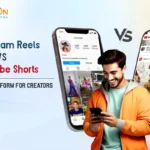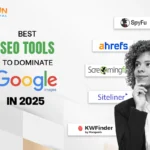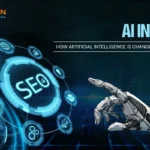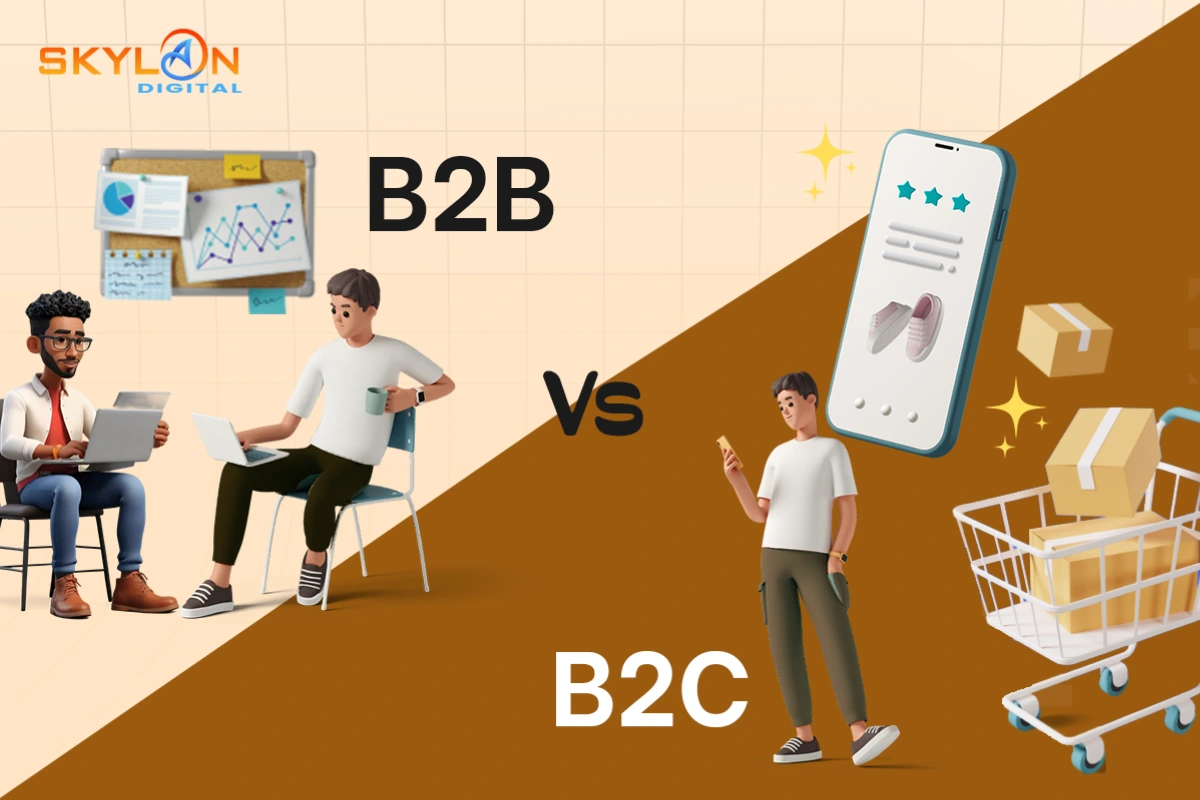
B2B and B2C marketing has crucial differences that you must be aware of to acquire success in your strategies. B2B targets long-term relations and provides value-driven content, on the other hand, B2C aims to foster quick emotional triggers. This guide highlights the major differences in such as messaging, platforms, strategies, as well as buyer journeys so that businesses can follow a more effective approach.
Introduction
In digital marketing, there are two (2) main models, i.e. B2B (Business To Business) and B2C (Business To Customer). These are the models of the type of customer you are looking to target, other businesses for B2B and individuals for B2C. The strategies used in B2B vs B2C digital marketing, however, can be very different. Knowing these differences is necessary for companies so as to maximize their efforts in marketing and reaching their target audience.
By considering marketing to either a business or a consumer, you will differentiate your path and approach, and therefore create a strategy that will resonate deeper with your target audience. At the end of this post, you will know exactly how to go about marketing to both B2B and B2C customers in a way that makes sense for your target audience.
B2B vs B2C Digital Marketing: The Core Differences
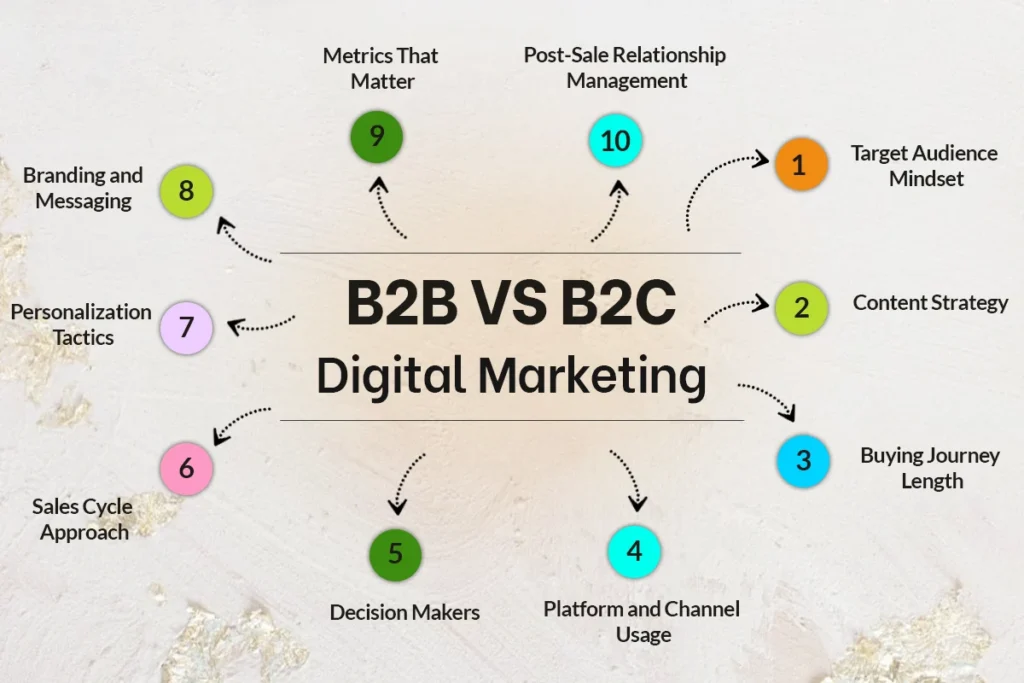
1. Target Audience Mindset
The key difference in B2B vs B2C digital marketing lies in the mind of a B2B and B2C audience. In B2B, the decision making is very much rational. Purchases are long term oriented and are always based on practical needs and they involve several decision makers within the organization. Decision cycles in these systems are longer, as this will require multiple stakeholders such as managers or procurement teams coming to an agreement on this decision.
Yet, B2C customers are fairly emotional ones. Moreover, during the decision-making process, it is quicker and more impulsive when the consumer feels that brand or product is close to him. Consequently, b2c marketers have to aim at those emotional triggers to have any impact.
2. Content Strategy
The content strategies for B2B digital marketing vs B2C digital marketing are also different. B2B content usually is more in depth and educational. B2B marketing typically includes white papers, case studies, webinars, and blog posts related to certain business challenges or trends. This content is built with the intention of creating trust and authority, demonstrating expertise and the worth a product or a service can provide.
B2C marketing content tends to be more entertaining and visual, as well as more emotional. Format consists of videos, social media posts as well as short blogs. In B2C, the goal is to quickly entice attention, create an emotional connection with the customer and create an impulse to buy.
3. Buying Journey Length
B2B marketing buyer journey is usually longer than B2C marketing buyer journey. B2B companies have to deal with many decision makers, several stages of approval before executing, and careful evaluation to be done. It talks about trust building and focuses on how exactly the product or service is going to help the buyer in accomplishing his business goal.
Whereas, the buying journey in case of B2C is shorter. There is a high consumer willing to take immediate action, made in an impulse, often based on emotions or immediate needs. Because fewer hurdles are in the way, the sales cycle is usually fast.
4. Platform and Channel Usage
B2B marketing, as opposed to B2C, gravitates towards professional platforms such as LinkedIn where business professionals come together to share experiences, network and make rational choices. B2B businesses also use email marketing, webinars, and really industry specific events (e.g. conferences) to engage potential clients.
However, B2C marketing uses platforms like Instagram, Facebook, TikTok, YouTube. These are channels that tend to offer the public a more direct and consumer friendly environment to engage with engaging content and advertising far and wide to a much larger audience.
5. Decision Makers
Typically the decision makers in B2B marketing are part of a team or committee. So they require the approval from these teams, such as from executives, or procurement heads or managers, these are the people who are approving the purchase. To solve the needs and concerns of each decision maker, B2B marketers are the ones who focus.
In B2C, the decision maker is generally an individual consumer and the purchasing decision is often made based on personal needs, social trends, and recommendations of friends or influencers. The decisions tend to be more emotional and quicker.
6. Sales Cycle Approach
However, the B2B marketing sales cycle is longer and relationship based. In B2B, account based marketing strategies (ABM) are frequently used to cultivate and collaborate with a company’s key stakeholders. This way of doing business focuses on long term value and quite often the goal is to sell again and to build a lasting partnership.
In the case of B2C there are high volume sales and generally promotions or offers during some seasons or aims to attract consumers in bulk. Thirdly, B2C marketing plan strategies are more likely to target a very broad audience using very broad marketing tactics which focus more on the current sales.
7. Personalization Tactics
Customization means something different to B2B marketing and B2C marketing. B2B marketers create very targeted messages that speak to the very pain points and challenges businesses have. In the B2B space, personalized emails or content that associates with the company’s particular goals or the industry are essential.
In B2C marketing personalization is usually based on the behaviour of the consumer. Tactics include offers based on past purchases, loyalty programs, or retargeting ads tracking consumers across a number of different platforms. It’s meant for B2C marketers who wish to repeat the customers’ purchases by providing personalized experiences.
8. Branding and Messaging
Brand messaging is different for B2B as compared to B2C businesses. It is Authority, trust and thought leadership in B2B. When messaging talks about the value proposition, featuring expertise, or flaunting the brand as a reliable partner within the business space, it will always work for your marketing.
The messaging in B2C marketing is more about becoming relatable and making an emotional connection. A brand needs to have a personality, have a story, to resonate with the consumer. Brand loyalty, emotional connection and making a powerful brand presence is the focus.
9. Metrics That Matter
For a B2B business, lead quality, conversion rates and lifetime value of a customer are key performance indicators. These are the metrics that will help you make out whether the marketing strategy is driving sustainable business growth.
For B2C marketing, which centers around branded interaction between the buyer and the product, KPIs include the sales volume, the customer acquisition costs, and the branding and the degree of engagement. B2C businesses aim to produce a high number of sales, and at a cost – effective marketing strategy.
10. Post-Sale Relationship Management
Also, B2B and B2C have different post sale strategies. In B2B marketing practice, relationship management is emphasized, and their tasks include maintaining ongoing engagement as well as upselling and cross selling. It’s about building relationships for the long term and increasing the value of customers throughout the process.
For B2C, loyalty programs or the incentive for repeated purchases similarly apply in the post-sale space. However, B2C companies also want to retain customer loyalty, but theirs tends to prioritize in offering and enticing their customers to buy them again rather than on maintaining.
Conclusion
The B2B and B2C strategies are simply different and understanding the difference will definitely make a big difference when it comes to the effectiveness of the digital marketing efforts. For B2B vs B2C examples, B2B marketing is relationship based and more based on a logical approach, which means that B2C marketing depends on emotional appeals and more on engaging, short living campaigns.
While developing your digital marketing plan, always ensure that you understand your audience thoroughly. If your target is a business or a consumer, tailor your strategies and your wording accordingly to fit their unique needs. Better results follow from the right strategy for the right audience.
FAQs
Q1. Can the same marketing tactics be used for both B2B and B2C?
Answer: While some core principles overlap, tactics need to be customized to the target audience’s mindset and buying behavior.
Q2. Why is content marketing more important in B2B?
Answer: B2B buyers require a higher level of expertise and trust before making large investments, which is why educational content is so crucial.
Q3. Which platforms are best for B2C marketing?
Answer: Platforms like Instagram, Facebook, TikTok, and YouTube are great for reaching and engaging with B2C consumers quickly.
Q4. Is emotional marketing useful in B2B?
Answer: Yes, but emotional appeals should support rational business decisions. While B2B decisions are mostly logic-driven, a touch of emotional connection can enhance the message.
Q5. How should small businesses decide between B2B and B2C strategies?
Answer: Small businesses should focus on their primary customer, whether it’s another business or a consumer, and tailor their marketing approach accordingly.


